Digital Guide to "A Tribute to MLK"

The lessons of Dr. King are shared across cultures and generations and echoes of his message continue to inspire the global community. Our tribute concert notes this universal connection, from the American south to the plains of Africa, the Pacific islands and here in Chicago, where Florence Price was the first African-American woman composer to have a work performed by a major orchestra.
IMPORTANT NOTE: Bass-baritone Eric Owens, who is profiled below, will not perform due to an injury. I’m a Soldier Spiritual Suite will now be sung by Robert Sims, and Maestro Chen will conduct Adagio For Strings. Mr. Sims, who was born in Chicago, has been highly praised for his moving interpretations of African American spirituals, and has given numerous recitals of them throughout the United States, Europe, Africa and Asia. Lena McLin wrote I’m a Soldier for Sims, and he performed its World Premiere with the Mormon Tabernacle Choir and Orchestra. The video that accompanies the article on Lena McLin below features Mr. Sims singing another Lena McLin arrangement. More on Robert Sims can be found on his website.
THE ARTISTS
Mei-Ann Chen, Music Director and conductor
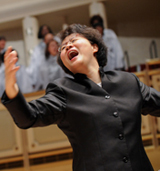 Chicago Sinfonietta founding Music Director Paul Freeman’s chance meeting with Dr. King at the Atlanta airport (the maestro was arriving there to guest conduct the Atlanta Symphony) that helped inspire him to found the Sinfonietta some 20 years later.
Chicago Sinfonietta founding Music Director Paul Freeman’s chance meeting with Dr. King at the Atlanta airport (the maestro was arriving there to guest conduct the Atlanta Symphony) that helped inspire him to found the Sinfonietta some 20 years later.
Mei-Ann Chen’s connection to Dr. King came nearly half a century later: “The opportunity to work with the Atlanta Symphony provided a crucial pivotal change in my musical career. As I got to experience the city that was so influential to Dr. King’s life, little did I know that I would later come to serve as music director in two other cities that played important roles in Dr. King’s legacy – Chicago and Memphis. When I came to the States as a teenager, Dr. King’s legacy and ‘I have a dream’ speech made a tremendous impact on me. Therefore I am extremely honored to continue the Sinfonietta’s very important tradition of its annual concert tribute to Dr. King.”
Last year, Maestro Chen’s debut leadership of the tribute garnered this praise from the Chicago Sun-Times: ”… she was born to lead this group and these historically conscious concerts… Substantive, moving, and joyous… Despite the ravages of the world outside, the hall became a place of true fellowship.”
Maestro Chen’s biography is here.
Maestro Chen previews the concert in this video.
Eric Owens, bass-baritone and guest conductor
 The Chicago Sinfonietta has long championed young musicians from diverse backgrounds as guest artists, showcasing their talents at many concerts over the years. As a relatively young conductor herself, Mei-Ann Chen is looking to do the same for aspiring conductors. And so it is that Eric Owens, one of the leading bass-baritones on the face of the earth, will not only sing at this year’s MLK tribute, but also make his professional conducting debut when he leads Barber’s Adagio.
The Chicago Sinfonietta has long championed young musicians from diverse backgrounds as guest artists, showcasing their talents at many concerts over the years. As a relatively young conductor herself, Mei-Ann Chen is looking to do the same for aspiring conductors. And so it is that Eric Owens, one of the leading bass-baritones on the face of the earth, will not only sing at this year’s MLK tribute, but also make his professional conducting debut when he leads Barber’s Adagio.
Acclaimed for his commanding stage presence and inventive artistry, the Grammy Award-winning Owens has carved a unique place in the contemporary opera world as both an esteemed interpreter of classic works and a champion of new music. He has performed lead roles with the San Francisco, Metropolitan and Lyric Operas, as well as many major orchestras including those in Atlanta, Boston, Los Angeles, Cleveland and Chicago.
The L.A. Times recently ran a great profile of Owens in advance of his Los Angeles Opera performances. Owens also has his own website jam-packed with audio samples, photos and more.
In this video, Owens talks about the need to make music.
Anthony McGill, clarinet
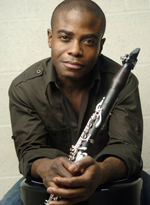 When he takes the stage at our MLK tribute, it will be almost exactly 4 years since clarinetist Anthony McGill played before his largest audience at the first inauguration of President Barack Obama alongside Yo-Yo Ma, Itzhak Perlman, and Gabriela Montero. (This year’s Symphony Center concert falls on Inauguration Day 2013.) “Being able to play with those amazing musicians and be a part of such a pivotal moment in history was something I’ll never forget” said McGill in a 2010 interview.
When he takes the stage at our MLK tribute, it will be almost exactly 4 years since clarinetist Anthony McGill played before his largest audience at the first inauguration of President Barack Obama alongside Yo-Yo Ma, Itzhak Perlman, and Gabriela Montero. (This year’s Symphony Center concert falls on Inauguration Day 2013.) “Being able to play with those amazing musicians and be a part of such a pivotal moment in history was something I’ll never forget” said McGill in a 2010 interview.
It’s especially fitting, then, that the South Side native will mark the anniversary of that occasion with another performance celebrating an important figure in African-American history, Dr. Martin Luther King, Jr. McGill, who grew up in the Chatham neighborhood and, as a youth, studied at the tuition-free Merit School Music, is the principal clarinetist for the Metropolitan Opera. His recent performance of Copland’s Clarinet Concerto at Carnegie Hall, which he’ll also perform here, was described as “dazzling” by the New York Times.
Anthony has a great website filled with reviews and audio plus Anthony’s blog and Twitter feed.
The video is of that presidential performance from CNN.
Waubonsie Valley High School Mosaic Choir | Mark Meyers, Music Director
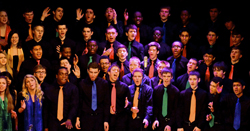 Mosaicis an auditioned choir of 135 students from Waubonsie Valley High School in Aurora, Illinois. The mission of Mosaicis to represent the rich cultural and ethnic diversity of Waubonsie Valley through its membership and repertoire, making the choir an especially appropriate choice for the global nature of this year’s MLK tribute. The choir was founded in the fall of 2003. They have collaborated with the Watoto Children’s Choir of Kampala, Uganda; South African singer-songwriter Vusi Mahlasela; jazz artist Kirk Whalum; and Master Drummer and Composer Sowah Mensah from Ghana, West Africa. They also performed for Rajmohan Gandhi (grandson of Mahatma Gandhi) as part of the Naperville Celebration of Peace.
Mosaicis an auditioned choir of 135 students from Waubonsie Valley High School in Aurora, Illinois. The mission of Mosaicis to represent the rich cultural and ethnic diversity of Waubonsie Valley through its membership and repertoire, making the choir an especially appropriate choice for the global nature of this year’s MLK tribute. The choir was founded in the fall of 2003. They have collaborated with the Watoto Children’s Choir of Kampala, Uganda; South African singer-songwriter Vusi Mahlasela; jazz artist Kirk Whalum; and Master Drummer and Composer Sowah Mensah from Ghana, West Africa. They also performed for Rajmohan Gandhi (grandson of Mahatma Gandhi) as part of the Naperville Celebration of Peace.
Our MLK tribute is their first collaboration with a professional symphony orchestra.
This video is an acapella performance of Ntakana, a traditional South African song that they will perform with the Sinfonietta along with two others from the American gospel tradition and a selection from Bali.
THE COMPOSERS
Florence Price – The Oak
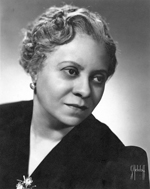 While there is a pronounced global flavor to this year’s tribute, the Chicago connections run deep as well. As already noted, clarinetist Anthony McGill grew up on the South Side. Composer Florence Price, the first African-American woman acknowledged as a symphonic composer, has a dual Chicago connection. Price was born and began her music career in Arkansas after studying at the New England Conservatory of Music. However, worsening racial tension in Arkansas convinced Price to move to Chicago in 1927, where she studied at the American Conservatory of Music and Chicago Musical College and established herself in as a teacher, pianist, and organist. In 1932, she composed the Symphony in E Minor, and it received its premiere by the Chicago Symphony Orchestra in 1933, the first time a black woman had her work presented on such a stage.
While there is a pronounced global flavor to this year’s tribute, the Chicago connections run deep as well. As already noted, clarinetist Anthony McGill grew up on the South Side. Composer Florence Price, the first African-American woman acknowledged as a symphonic composer, has a dual Chicago connection. Price was born and began her music career in Arkansas after studying at the New England Conservatory of Music. However, worsening racial tension in Arkansas convinced Price to move to Chicago in 1927, where she studied at the American Conservatory of Music and Chicago Musical College and established herself in as a teacher, pianist, and organist. In 1932, she composed the Symphony in E Minor, and it received its premiere by the Chicago Symphony Orchestra in 1933, the first time a black woman had her work presented on such a stage.
The Oak, a tone poem that evokes southern melodies and rhythms with a soulful, authentic spirituality, was written in 1934, and is the first of two Florence Price works that Mei-Ann Chen will lead in Chicago this year. In May, Mei-Ann will conduct her Mississippi River Suite with the very same Chicago Symphony Orchestra that first performed the Symphony in E Minor.
The Arkansas Encyclopedia of History and Culture has a fairly thorough chapter on Price.
The video features her historic Symphony in E Minor.
Samuel Barber – Adagio for Strings
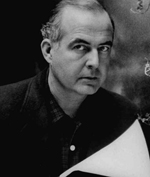 Samuel Barber is one of the most celebrated composers of the 20th century. He composed orchestral, opera, choral and piano music. He was awarded the Pulitzer Prize for music twice. A child prodigy, he wrote his first piano piece at age 7 and his first opera at the 10. He was accepted into the Curtis Institute of Music at 14.
Samuel Barber is one of the most celebrated composers of the 20th century. He composed orchestral, opera, choral and piano music. He was awarded the Pulitzer Prize for music twice. A child prodigy, he wrote his first piano piece at age 7 and his first opera at the 10. He was accepted into the Curtis Institute of Music at 14.
His Adagio for Strings, written at the age of 28, has been called one of the saddest pieces of music ever written. It reminds us that the struggle for civil rights is just that: a struggle. The piece’s elegiac strains were introduced to the larger public through its particularly poignant use in the 1986 film Platoon. An uneasy sadness lingers in the piece, as a tense melody slowly and hesitantly moves through a kind of lament, building to a climax, after which the piece shifts into a quiet resolution. It’s an interesting choice for the conducting debut of a world famous singer.
This NPR Music piece include audio samples and was written on the occasion of the 100th anniversary of Barber’s birth.
The video is a good measure of the emotional resonance of the Adagio, as it was performed just days after the September 11 attack on New York City in remembrance of the lives lost.
Aaron Copland – Clarinet Concerto
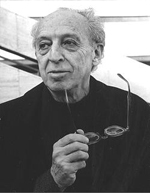 From Samuel Barber we move to another giant of American music, Aaron Copland. He forged a distinctly American style of composition, and in his later years he was often referred to as “the Dean of American Composers”. He is perhaps best known to the public for the works he wrote in the 1930s and 1940s in a deliberately accessible style which the composer labeled his “vernacular” style.
From Samuel Barber we move to another giant of American music, Aaron Copland. He forged a distinctly American style of composition, and in his later years he was often referred to as “the Dean of American Composers”. He is perhaps best known to the public for the works he wrote in the 1930s and 1940s in a deliberately accessible style which the composer labeled his “vernacular” style.
The Clarinet Concerto certainly fits this approach. It was commissioned by the jazz clarinetist and bandleader Benny Goodman in 1947. Goodman didn’t give Copland any direction. The composer had free reign to follow his muse. What resulted is somewhat unusual in structure; a lyrical, almost pastoral first movement followed by a playful, rhythmic second, the sections joined by a clarinet credenza. Copland was living in Rio de Janeiro at the time, and a Latin American feel is present, especially in the second movement. It’s a showcase for a virtuoso, and Anthony McGill’s performance will surely be up to it.
NPR Music has an extensive archive of articles, features, and performances by and about Aaron Copland.
The second movement of his concerto, with the composer himself conducting and featuring Goodman on clarinet, is featured in this video.
Obo Addy – Wawshishijay (Our Beginning)
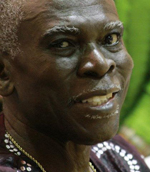 Master drummer Obo Addy, one of the key originators of the seminal musical movement now known as “Worldbeat,” was a prominent member of the first generation of African musicians to bring their traditional and popular music to Europe and America. An original and respected composer whose music reaches far beyond the boundaries of his land of birth, Addy had a forty-year presence on the international performing arts scene and became known for his ability to celebrate past traditions while expanding to embrace new ideas and foreign influences.
Master drummer Obo Addy, one of the key originators of the seminal musical movement now known as “Worldbeat,” was a prominent member of the first generation of African musicians to bring their traditional and popular music to Europe and America. An original and respected composer whose music reaches far beyond the boundaries of his land of birth, Addy had a forty-year presence on the international performing arts scene and became known for his ability to celebrate past traditions while expanding to embrace new ideas and foreign influences.
Addy was born in Ghana, moved to England in 1972 at the age of 36, then on to the United States 6 years later. Throughout his career in the west, he collaborated with countless jazz and classical musicians, prominent among them pianist Randy Weston and drummer Dana Hall. He also led two ensembles of his own, one dedicated to traditional music, the other more popular forms. In 1992, Addy was commissioned by the innovative classical music rebels the Kronos Quartet to compose “Wawshishijay” for their chart-topping album Pieces of Africa.
Obo Addy passed away in September 2012, but the Obo Addy Legacy Project continues his work.
The video is of Obo Addy and Okropong performing traditional Ghanaian music.
I’m a Soldier: Spiritual Suite for Baritone and Orchestra – Lena McLin
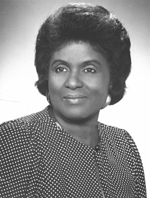 Eric Owens returns to the stage to do what he is famous for: sing. The Chicago connection continues with this spiritually based composition. Lena McLin is a graduate of Spelman College and did graduate studies at the American Conservatory of Music and Roosevelt University. She taught music in the Chicago public high schools for 36 years, cultivating hundreds of young musicians. Her contributions to education, music and American culture have been recognized by her receipt of the Outstanding Teacher Award from the Chicago Public Schools and honorary doctorates from Spelman College and Virginia Union University. She was a childhood and personal friend of Dr. King as she was born in Atlanta, Georgia.
Eric Owens returns to the stage to do what he is famous for: sing. The Chicago connection continues with this spiritually based composition. Lena McLin is a graduate of Spelman College and did graduate studies at the American Conservatory of Music and Roosevelt University. She taught music in the Chicago public high schools for 36 years, cultivating hundreds of young musicians. Her contributions to education, music and American culture have been recognized by her receipt of the Outstanding Teacher Award from the Chicago Public Schools and honorary doctorates from Spelman College and Virginia Union University. She was a childhood and personal friend of Dr. King as she was born in Atlanta, Georgia.
I’m a Soldier was commissioned by the Chicago-based baritone Robert Sims, who specializes in the performance of African American Folk Songs and Spirituals. It premiered in 2011 featuring Robert Sims and the Mormon Tabernacle Choir and orchestra at Temple Square in Salt Lake City, Utah. Although it has also been performed by numerous orchestras around the country, the Sinfonietta performance will be its Chicago premier. I’m a Soldier ends with “Don’t you let nobody turn you ’round” which was a favorite civil rights song sung during the March on Washington.
PBS.org has a short McLin biography.
The video features Robert Sims in McLin’s arrangement of Glory, Glory Hallelujah.
Global Songs of Praise – Various composers
The universality of Dr. King’s message is reflected in this mix of choir pieces from Indonesia, South Africa, and the spiritual traditions of the American south. The Mosaic Choir of Waubonsie Valley High School is ideal for the stylistic breadth of these pieces. The mission of Mosaicis to represent the rich cultural and ethnic diversity of Waubonsie Valley. The pieces heard at this tribute concert include Janger, a traditional Balinese folk song, Ntakana from South Africa (see Mosaic Choir feature above for a video of that), and two African-American spirituals, This is My Prayer and Total Praise. All are part of Mosaic’s repertoire, but this concert features their debut with an orchestral accompaniment.
This video showcases the gospel side of Mosaic’s repertoire in a performance of Total Praise from the House of Blues Gospel Brunch.
Research and copy by Don Macica. Design by Ryan Smith

